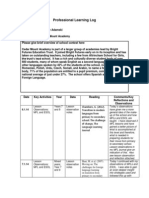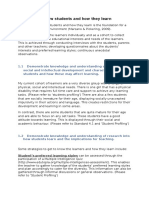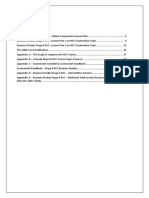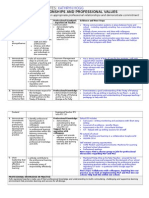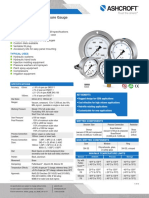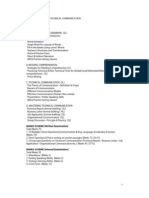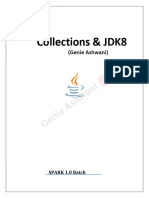0 ratings0% found this document useful (0 votes)
113 viewsEvidence Set 1 - Student Focus
Evidence Set 1 - Student Focus
Uploaded by
api-461954125The teacher developed an individualized education plan to help a struggling student with dyslexia. After implementing differentiated lessons and literacy strategies, the student was able to complete tasks, pass the OLNA, and achieve higher grades by the end of the year.
Copyright:
© All Rights Reserved
Available Formats
Download as PDF, TXT or read online from Scribd
Evidence Set 1 - Student Focus
Evidence Set 1 - Student Focus
Uploaded by
api-4619541250 ratings0% found this document useful (0 votes)
113 views1 pageThe teacher developed an individualized education plan to help a struggling student with dyslexia. After implementing differentiated lessons and literacy strategies, the student was able to complete tasks, pass the OLNA, and achieve higher grades by the end of the year.
Original Title
evidence set 1 - student focus
Copyright
© © All Rights Reserved
Available Formats
PDF, TXT or read online from Scribd
Share this document
Did you find this document useful?
Is this content inappropriate?
The teacher developed an individualized education plan to help a struggling student with dyslexia. After implementing differentiated lessons and literacy strategies, the student was able to complete tasks, pass the OLNA, and achieve higher grades by the end of the year.
Copyright:
© All Rights Reserved
Available Formats
Download as PDF, TXT or read online from Scribd
Download as pdf or txt
0 ratings0% found this document useful (0 votes)
113 views1 pageEvidence Set 1 - Student Focus
Evidence Set 1 - Student Focus
Uploaded by
api-461954125The teacher developed an individualized education plan to help a struggling student with dyslexia. After implementing differentiated lessons and literacy strategies, the student was able to complete tasks, pass the OLNA, and achieve higher grades by the end of the year.
Copyright:
© All Rights Reserved
Available Formats
Download as PDF, TXT or read online from Scribd
Download as pdf or txt
You are on page 1of 1
11/04/2019
Professional Portfolio Evidence Example
Name: Harriet Pugh E Number: e4063278 School: Fremantle College Yr Level/Subject Area: English Year 11
Situation: Action: Outcome:
In 2018, I was scheduled to teach a Year 11 General English class. I ran a diagnostic and discovered several students had dyslexia. One After a semester, the student was able to complete designated tasks
There were 28 students in the class, 19 of which had not met the student in particular was not able to complete a simple Year 8 task. I within the class time and received 58 per cent in English. The student
minimum literacy and numeracy requirements to graduate. Many kept the student back after class to have a private dialogue regarding passed all aspects of OLNA in September and went on to achieve a
students had attendance under 70 per cent, which was even more this work. He was very distressed and upset in his effort, and B grade at the end of the year. The student received a range of
evident after only 4 students submitted the first assessment in Week disclosed that he has a learning issue (4.1). I got permission from the commendations from various teachers and was now on track to
2. This class was a combination of South Fremantle and Hamilton student to contact his carers to discuss my concerns further. Before graduate. He developed several friends in that class, which he is still
Hill SHS, and were incredibly disengaged. They would not answer calling the carers, I looked up the student on the school system close with. I was able to up-skill my teaching in differentiation,
questions, complete work or submit assessments. The class average where there were not notes. I met with the school psychologist and collaboration with teachers and literacy instructional strategies. The
was 26 per cent after two assessments. I ran a diagnostic which several other teachers to discuss his work (6.3). No-one knew what carers sent various emails of praise and appreciation for my efforts in
made it evident that over a third of the class were below expected was the reason for his poor performance. After calling the carers, it supporting this student. I was also commended on my initiative of
skill level and several students were advanced. This student in was clear this student has a learning processing issue (3.7, 7.3). I creating an IEP and informing other teachers to improve their ability
particular had not passed any OLNA components or English the year developed an IEP with consultation of DSF and the student’s MESH to support this students.
before (5.4). He had good attendance and no behavioural concerns. teachers. I implemented six key strategies, incorporating the
student’s ability and access to resources, and differentiated lessons
to assist his learning (1.1, 1.3, 1.5, 3.3). I utilised his love for
technology and colours to form a new note-taking system (1.2). I had
lesson instructions written on the board so he could frequently
refocus on what to do next and be included in all class activities (1.6).
After reflecting on the IEP with the student, his carers and his
teachers at the end of the term, he began an individualised literacy
homework program to help him achieve the requirements he needed
for OLNA (2.5, 3.1) based on a literacy PL I requested to attend (6.1).
I was able to give meaningful feedback on his progress through both
formal and informal comments (5.2, 5.5).
Supporting Evidence: Year 11 Assessment Outline, Student Diagnostic Assessment Piece, Student Progress Assessment Piece, Draft IEP, Edited IEP, GEP, Parent Email, Colleague Email, Commendation
Certificate, Scaffolded Worksheet and Lesson Plan with Literacy Strategies.
1. Know students and how they learn 3. Plan for and implement effective teaching and learning 6. Engage in professional learning
1.1 Physical, social and intellectual development and 3.1 Establish challenging learning goals 6.1 Identify and plan professional learning needs
characteristics of students 3.2 Plan, structure and sequence learning programs 6.2 Engage in professional learning and improve practice
1.2 Understand how students learn 3.3 Use teaching strategies Include a range of teaching 6.3 Engage with colleagues and improve practice
1.3 Students with diverse linguistic, cultural, religious and strategies 6.4 Apply professional learning and improve student
socioeconomic backgrounds 3.4 Select and use resources learning
1.4 Strategies for teaching Aboriginal and Torres Strait 3.5 Use effective classroom communication 7. Engage professionally with colleagues, parents/carers and the
Islander students 3.6 Evaluate and improve teaching programs community
1.5 Differentiate teaching to meet the specific learning 3.7 Engage parents/carers in the educative process 7.1 Meet professional ethics and responsibilities
needs of students across the full range of abilities 4. Create and maintain supportive and safe learning environments 7.2 Comply with legislative, administrative and
1.6 Strategies to support full participation of students with 4.1 Support student organisational requirements
disability 4.2 Manage classroom activities 7.3 Engage with the parents/ carers
2. Know the content and how to teach it 4.3 Manage challenging behaviour 7.4 Engage with professional teaching networks and
2.1 Content and teaching strategies of the teaching area 4.4 Maintain student safety broader communities
2.2 Content selection and organisation 4.5 Use ICT safely, responsibly and ethically
2.3 Curriculum, assessment and reporting 5. Assess, provide feedback and report on student learning
2.4 Understand and respect Aboriginal and Torres Strait 5.1 Assess student learning
Islander people to promote reconciliation between 5.2 Provide feedback to students on their learning
Indigenous and non-Indigenous Australians 5.3 Make consistent and comparable judgements
2.5 Literacy and numeracy strategies 5.4 Interpret student data
2.6 Information and Communication Technology (ICT) 5.5 Report on student achievement
You might also like
- Micro and Macro of SpeakingDocument2 pagesMicro and Macro of SpeakingRafi Addin86% (7)
- 7411edn Assignment 1Document23 pages7411edn Assignment 1Curtis AllnuttNo ratings yet
- Professional Learning JournalDocument5 pagesProfessional Learning Journalapi-525578562No ratings yet
- DTL Assessment 1 - FinalDocument8 pagesDTL Assessment 1 - Finalapi-505912741No ratings yet
- Professional Practice Community Engagement pp3Document3 pagesProfessional Practice Community Engagement pp3api-374396981No ratings yet
- J Pina 102082 Assig 1 EssayDocument6 pagesJ Pina 102082 Assig 1 Essayapi-321469415No ratings yet
- The Gold Coast Transformed: From Wilderness to Urban EcosystemFrom EverandThe Gold Coast Transformed: From Wilderness to Urban EcosystemTor HundloeNo ratings yet
- Solved Pacific Coast Fisheries Corporation Issued More Than 5 Percent ofDocument1 pageSolved Pacific Coast Fisheries Corporation Issued More Than 5 Percent ofAnbu jaromiaNo ratings yet
- Standard 5Document2 pagesStandard 5api-316619470No ratings yet
- Professional Learning LogDocument4 pagesProfessional Learning Logapi-249064468No ratings yet
- Behaviour Management PlanDocument1 pageBehaviour Management Planapi-242936990No ratings yet
- Professional Learning Journal TRB Sian Wailes 2021Document6 pagesProfessional Learning Journal TRB Sian Wailes 2021api-297737638No ratings yet
- Standard 6Document4 pagesStandard 6api-305894690No ratings yet
- Standard SixDocument2 pagesStandard Sixapi-249815522No ratings yet
- PLP At1Document23 pagesPLP At1api-511483529No ratings yet
- Apst 3Document3 pagesApst 3api-457784453No ratings yet
- Assignment OneDocument45 pagesAssignment Oneapi-355627407No ratings yet
- Aitsl National Professional Standards Ict Elaborations Lams 2014Document11 pagesAitsl National Professional Standards Ict Elaborations Lams 2014api-249206311No ratings yet
- Edfd452 At2 Critical Reflections Elsie StoelDocument6 pagesEdfd452 At2 Critical Reflections Elsie Stoelapi-319869838No ratings yet
- PLP For WebsiteDocument13 pagesPLP For Websiteapi-512783934No ratings yet
- Rationale - Assignment 1Document2 pagesRationale - Assignment 1api-478554972No ratings yet
- Evidence For TRB RegistrationDocument37 pagesEvidence For TRB Registrationapi-396981495No ratings yet
- Luke Ranieri 17698506 Ppce RationaleDocument1 pageLuke Ranieri 17698506 Ppce Rationaleapi-486580157No ratings yet
- DTL 19187336 A2 Lesson Plan Analysis and ModificationDocument15 pagesDTL 19187336 A2 Lesson Plan Analysis and Modificationapi-374403345100% (1)
- Assessment Two EdfdDocument8 pagesAssessment Two Edfdapi-265573453No ratings yet
- Ppce Self ReflectionDocument2 pagesPpce Self Reflectionapi-356883750No ratings yet
- rtl2 Assignment 2Document12 pagesrtl2 Assignment 2api-403333254No ratings yet
- Assessment 2 - 10096097Document13 pagesAssessment 2 - 10096097api-428550300100% (1)
- Ppce RationaleDocument1 pagePpce Rationaleapi-554337285No ratings yet
- Assessment Cover Sheet: School of Teacher EducationDocument5 pagesAssessment Cover Sheet: School of Teacher EducationnatalieNo ratings yet
- EDU30006-A1-Humanities Portfolio-Maddison Edebohls-102906427Document11 pagesEDU30006-A1-Humanities Portfolio-Maddison Edebohls-102906427Maddie EdebohlsNo ratings yet
- E Portfolio Standards 6 and 7Document10 pagesE Portfolio Standards 6 and 7api-287660266No ratings yet
- PLP For WeeblyDocument7 pagesPLP For Weeblyapi-513142546No ratings yet
- Action ResearchDocument3 pagesAction ResearchKarobi DeyNo ratings yet
- Ppce - RationaleDocument1 pagePpce - Rationaleapi-357684876No ratings yet
- Assignment Cover Sheet: Imran Ali Tamer 18019647Document17 pagesAssignment Cover Sheet: Imran Ali Tamer 18019647api-369323765No ratings yet
- Positive Learning Environments and Classroom Behavioural TheoryDocument11 pagesPositive Learning Environments and Classroom Behavioural Theoryapi-459576779No ratings yet
- Adolescent Development and TeachingDocument1 pageAdolescent Development and Teachingapi-461572829No ratings yet
- Unit 102082 Philosophy of Classroom Management Document R 1h208Document17 pagesUnit 102082 Philosophy of Classroom Management Document R 1h208api-374359307No ratings yet
- Gbryant Ept GoalsDocument5 pagesGbryant Ept Goalsapi-370836163No ratings yet
- Aneja Ppce 102605 Self ReflectionDocument3 pagesAneja Ppce 102605 Self Reflectionapi-356533687No ratings yet
- Edfd462 Assignment 1 FinalDocument20 pagesEdfd462 Assignment 1 Finalapi-239589333No ratings yet
- Assertive in ClassroomDocument5 pagesAssertive in ClassroomAtiqa NurNo ratings yet
- Impact On Students Learning ReflectionDocument4 pagesImpact On Students Learning Reflectionapi-308414337No ratings yet
- Eec Task 1 HSC 2016 Play Developing ChildDocument9 pagesEec Task 1 HSC 2016 Play Developing Childapi-235014647100% (2)
- Overview of Site Organisation of Unit of Work Unit of Work Community EngagementDocument27 pagesOverview of Site Organisation of Unit of Work Unit of Work Community Engagementapi-409698216No ratings yet
- Edfd260 Assignment 2Document9 pagesEdfd260 Assignment 2api-252779423No ratings yet
- Kass pp3 Self ReflectionDocument4 pagesKass pp3 Self Reflectionapi-321140460No ratings yet
- Module 5 AssessmentDocument7 pagesModule 5 Assessmentapi-301204206No ratings yet
- 18897803Document2 pages18897803api-374903028No ratings yet
- Parent Teacher CNF Notes 5-11-2020Document1 pageParent Teacher CNF Notes 5-11-2020api-530415478No ratings yet
- Unit Outline Pdhpe Cameron WallaceDocument28 pagesUnit Outline Pdhpe Cameron Wallaceapi-408345354No ratings yet
- StudentvoiceDocument20 pagesStudentvoiceapi-236388425No ratings yet
- Standard 1Document7 pagesStandard 1api-335128593100% (1)
- rtl1 Assessment 2Document15 pagesrtl1 Assessment 2api-368798504No ratings yet
- Assignment 2 - Secondary Curriculum 2a Business Studies-MustaphaDocument51 pagesAssignment 2 - Secondary Curriculum 2a Business Studies-Mustaphaapi-327720466No ratings yet
- Lidyajosef Edre102 Assessment2aDocument9 pagesLidyajosef Edre102 Assessment2aapi-319857946No ratings yet
- Assignment 3 IlpDocument13 pagesAssignment 3 Ilpapi-405568409No ratings yet
- Appraisal Notes 2014 - KathrynDocument7 pagesAppraisal Notes 2014 - KathrynKathryn HoggNo ratings yet
- Assessment 1 Reflection - Standard 2 Focus Area 2 4Document3 pagesAssessment 1 Reflection - Standard 2 Focus Area 2 4api-265542260No ratings yet
- Inclusive Assessment 1Document10 pagesInclusive Assessment 1api-483696979No ratings yet
- Resume of Shawn - PenryDocument2 pagesResume of Shawn - Penryapi-31600742No ratings yet
- Enotes Blues For Mister Charlie GuideDocument6 pagesEnotes Blues For Mister Charlie GuideTiffany RaghoonananNo ratings yet
- Python PracticalsDocument33 pagesPython PracticalsShehbaz Hasware100% (2)
- 8008A Commercial Pressure Gauge: Data SheetDocument10 pages8008A Commercial Pressure Gauge: Data SheetchienncNo ratings yet
- NPC v. Province of PangasinanDocument3 pagesNPC v. Province of PangasinanRiena MaeNo ratings yet
- My Corrupted AngelDocument442 pagesMy Corrupted Angelzinhle shomelaNo ratings yet
- Chapter 3 - LevelingDocument6 pagesChapter 3 - LevelingjethcahfayeregisalcantaraNo ratings yet
- Chapter Learning Objectives: After Studying This Chapter, You Should Be Able ToDocument13 pagesChapter Learning Objectives: After Studying This Chapter, You Should Be Able ToAkhil KalraNo ratings yet
- Obligations and ContractsDocument115 pagesObligations and ContractsGabrielle AlonzoNo ratings yet
- Comprensive Exam Final-1Document31 pagesComprensive Exam Final-1fuadabdurezak451No ratings yet
- Mental Health Case StudyDocument12 pagesMental Health Case Studyapi-546884730No ratings yet
- Gen-Mth-111 Customer Journey - ExternalDocument55 pagesGen-Mth-111 Customer Journey - ExternalSandwip RoyNo ratings yet
- (Earth and Space Science (Science Readers) ) Greg Young-Alfred Wegener. Uncovering Plate Tectonics-Shell Education - Teacher Created Materials (2008)Document35 pages(Earth and Space Science (Science Readers) ) Greg Young-Alfred Wegener. Uncovering Plate Tectonics-Shell Education - Teacher Created Materials (2008)Peter GonzálezNo ratings yet
- Investment AppraisalDocument7 pagesInvestment AppraisalAbdul KhaliqNo ratings yet
- Day Keeper Pages COMPLETE Fill in The Blanks (1) .Document91 pagesDay Keeper Pages COMPLETE Fill in The Blanks (1) .Luca Silvia 'Lisa'No ratings yet
- Oct. 9, 2024, Letter From Bill Cassidy To Endocrine Society (Re: Cass Review and Clinical Practice Guideline)Document4 pagesOct. 9, 2024, Letter From Bill Cassidy To Endocrine Society (Re: Cass Review and Clinical Practice Guideline)web-producersNo ratings yet
- Refutation & RebuttalDocument2 pagesRefutation & RebuttalAlmiraNo ratings yet
- BerbetinDocument4 pagesBerbetinMariteNo ratings yet
- HU101 - English Language & Technical CommunicationDocument3 pagesHU101 - English Language & Technical CommunicationMyWBUT - Home for Engineers0% (1)
- Determination of The Percentage of Ligands in Coordination CompoundDocument10 pagesDetermination of The Percentage of Ligands in Coordination CompoundIryani ZulkifleeNo ratings yet
- Project WorkDocument41 pagesProject WorkOlogunleko Seun damiNo ratings yet
- PHY-251 Centripetal Force LabDocument7 pagesPHY-251 Centripetal Force LabRenzo Jose Canro CalderonNo ratings yet
- Rizal LessonsDocument11 pagesRizal LessonsMarielle Guerra04No ratings yet
- A Brief Overview: Minkul Tekwani, Muzammil Shadab MSRIT, BangaloreDocument18 pagesA Brief Overview: Minkul Tekwani, Muzammil Shadab MSRIT, Bangaloreminkul222100% (1)
- Collections and Java8Document114 pagesCollections and Java8singhnikhilsingh21No ratings yet
- DPS User GuideDocument33 pagesDPS User GuideLorenzo TorresNo ratings yet
- Civil Engineering OrientationDocument75 pagesCivil Engineering Orientationelviraandadi14No ratings yet









